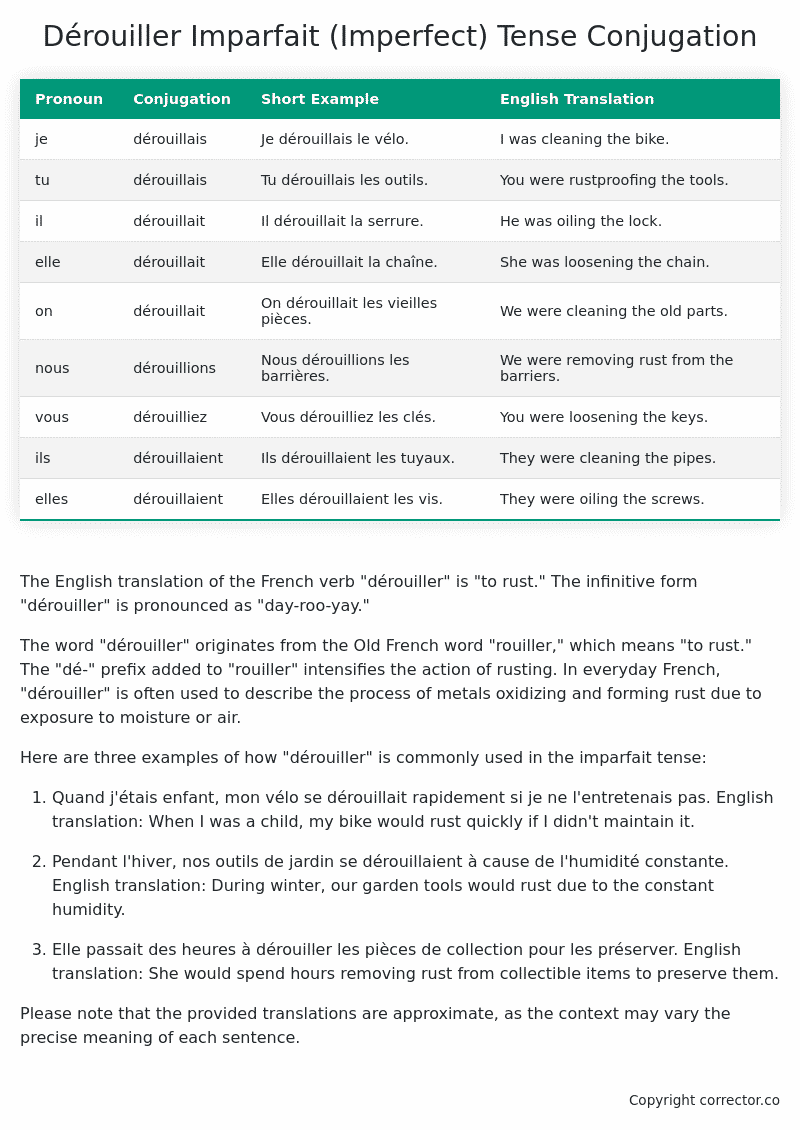Imparfait (Imperfect) Tense Conjugation of the French Verb dérouiller
Introduction to the verb dérouiller
The English translation of the French verb “dérouiller” is “to rust.” The infinitive form “dérouiller” is pronounced as “day-roo-yay.”
The word “dérouiller” originates from the Old French word “rouiller,” which means “to rust.” The “dé-” prefix added to “rouiller” intensifies the action of rusting. In everyday French, “dérouiller” is often used to describe the process of metals oxidizing and forming rust due to exposure to moisture or air.
Here are three examples of how “dérouiller” is commonly used in the imparfait tense:
-
Quand j’étais enfant, mon vélo se dérouillait rapidement si je ne l’entretenais pas.
English translation: When I was a child, my bike would rust quickly if I didn’t maintain it. -
Pendant l’hiver, nos outils de jardin se dérouillaient à cause de l’humidité constante.
English translation: During winter, our garden tools would rust due to the constant humidity. -
Elle passait des heures à dérouiller les pièces de collection pour les préserver.
English translation: She would spend hours removing rust from collectible items to preserve them.
Please note that the provided translations are approximate, as the context may vary the precise meaning of each sentence.
Table of the Imparfait (Imperfect) Tense Conjugation of dérouiller
| Pronoun | Conjugation | Short Example | English Translation |
|---|---|---|---|
| je | dérouillais | Je dérouillais le vélo. | I was cleaning the bike. |
| tu | dérouillais | Tu dérouillais les outils. | You were rustproofing the tools. |
| il | dérouillait | Il dérouillait la serrure. | He was oiling the lock. |
| elle | dérouillait | Elle dérouillait la chaîne. | She was loosening the chain. |
| on | dérouillait | On dérouillait les vieilles pièces. | We were cleaning the old parts. |
| nous | dérouillions | Nous dérouillions les barrières. | We were removing rust from the barriers. |
| vous | dérouilliez | Vous dérouilliez les clés. | You were loosening the keys. |
| ils | dérouillaient | Ils dérouillaient les tuyaux. | They were cleaning the pipes. |
| elles | dérouillaient | Elles dérouillaient les vis. | They were oiling the screws. |
Other Conjugations for Dérouiller.
Le Present (Present Tense) Conjugation of the French Verb dérouiller
Imparfait (Imperfect) Tense Conjugation of the French Verb dérouiller (You’re reading it right now!)
Passé Simple (Simple Past) Tense Conjugation of the French Verb dérouiller
Passé Composé (Present Perfect) Tense Conjugation of the French Verb dérouiller
Futur Simple (Simple Future) Tense Conjugation of the French Verb dérouiller
Futur Proche (Near Future) Tense Conjugation of the French Verb dérouiller
Plus-que-parfait (Pluperfect) Tense Conjugation of the French Verb dérouiller
Passé Antérieur (Past Anterior) Tense Conjugation of the French Verb dérouiller
Futur Antérieur (Future Anterior) Tense Conjugation of the French Verb dérouiller
Subjonctif Présent (Subjunctive Present) Tense Conjugation of the French Verb dérouiller
Subjonctif Passé (Subjunctive Past) Tense Conjugation of the French Verb dérouiller
Subjonctif Imparfait (Subjunctive Imperfect) Tense Conjugation of the French Verb dérouiller
Subjonctif Plus-que-parfait (Subjunctive Pluperfect) Tense Conjugation of the French Verb dérouiller
Conditionnel Présent (Conditional Present) Tense Conjugation of the French Verb dérouiller
Conditionnel Passé (Conditional Past) Tense Conjugation of the French Verb dérouiller
Conditionnel Passé II (Conditional Past II) Tense Conjugation of the French Verb dérouiller
L’impératif Présent (Imperative Present) Tense Conjugation of the French Verb dérouiller
L’impératif Passé (Imperative Past) Tense Conjugation of the French Verb dérouiller
L’infinitif Présent (Infinitive Present) Tense Conjugation of the French Verb dérouiller
L’infinitif Passé (Infinitive Past) Tense Conjugation of the French Verb dérouiller
Le Participe Présent (Present Participle) Tense Conjugation of the French Verb dérouiller
Le Participe Passé (Past Participle) Tense Conjugation of the French Verb dérouiller
Struggling with French verbs or the language in general? Why not use our free French Grammar Checker – no registration required!
Get a FREE Download Study Sheet of this Conjugation 🔥
Simply right click the image below, click “save image” and get your free reference for the dérouiller imparfait tense conjugation!

Dérouiller – About the French Imparfait Tense
NOTE: To take a deep dive into all the French tenses then see our article on Mastering French Tense Conjugation.
Formation of the Imparfait Tense
For regular -er verbs:
For regular -ir verbs
For regular -re verbs
Common Everyday Usage Patterns
Description of Past Habits
Background Information
Mental and Emotional States
It’s employed to express emotions, thoughts, or physical sensations in the past. For example: “J’étais content quand il est arrivé.” (I was happy when he arrived.)
Ongoing Actions
Points to Note About the Imparfait Tense
Passé Composé vs. Imparfait
Conditional
Si Clauses
Narration
I hope you enjoyed this article on the verb dérouiller. Still in a learning mood? Check out another TOTALLY random French verb imparfait conjugation!


